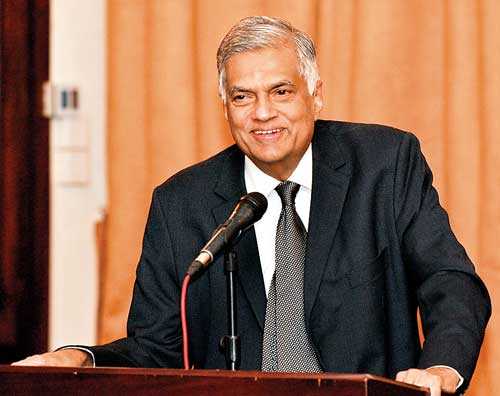Monday Feb 23, 2026
Monday Feb 23, 2026
Thursday, 28 June 2018 00:00 - - {{hitsCtrl.values.hits}}
By Uditha Jayasinghe
The Government plans to release Rs. 10 billion in development finance to the private sector, particularly targeted at large-scale companies willing to expand their businesses overseas and improve competitiveness, an upbeat Prime Minister Ranil Wickremesinghe announced this week. 
Speaking at the Sri Lanka Institute of Directors (SLID) Annual General Meeting (AGM) on Tuesday, Wickremesinghe noted that the Finance Ministry was in the midst of formulating a Development Finance Corporation, but ahead of its establishment the Government would earmark Rs. 10 billion to be released to the private sector. He also said the Government would be willing to increase the threshold if the private sector required additional funding.
“We want to help the large private sector. We want to start a Development Finance Corporation and the Finance Ministry is preparing the necessary Cabinet papers with the Central Bank and two State banks as stakeholders. But even before this corporation is formed we are going to release Rs. 10 billion to go through the stakeholders so they can utilise it this year itself. Let’s see how many will use that development finance. If you utilise it, what can we do? We will come up with more. Are you ready? Are you ready to go out?”
The Prime Minister quipped that this was one way for the Government to return tax money collected from the private sector. However, striking a sombre note, Wickremesinghe emphasised on the crucial role the private sector must play if Sri Lanka is to expand economic growth in the short to medium term.
“We want growth. As a Government we realise the main role lies with the private sector so we need to change the thinking. Take those opportunities. It is not just you who needs to change your attitude but also the Government. You can’t have a bureaucracy with lots of red tape because time is money. This is why we are looking at the Ease of Doing Business rankings and I have some more radical solutions. We are doing a lot of work in this area, to remove legislation but this will take some time.”
Wickremesinghe called for a broadened dialogue between the private sector and the Government urging the private sector to communicate clearly and effectively with the Government on genuine issues that would impact the national interests of Sri Lanka.
“Growth is not only business, it’s also politics. So let’s all work together.”
The Prime Minister also spoke extensively of the opportunities that exist in South and Southeast Asia that local companies to tap into to create opportunities and dominate niche markets, which Sri Lankan businesses already have a track record for doing.
“We live in the Southeast Asian region, which is going to be a growing market for the next few decades. Just as much as we have all the opportunity to go to the European market with GSP+ we need more products doing into these markets. Not merely apparel and rubber tires and fish. It means a mindset wiling to face competition. The small and medium enterprises as much as the big companies have a role to play and our job is to help.”
‘Enterprise Sri Lanka’ is the first step in this direction where 15 lines of credit have been introduced so that entrepreneurs, SMEs and large businesses can all have access to finance, Wickremesinghe noted. He also invited private banks to join the program and support SMEs and pointed out that other developed or developing countries rely on SMEs to create jobs and improve living standards.
“My question is, are you confident enough to take the challenge? It is all about access to markets. You can’t grow fast in a market of 22 million people. If we are to grow you must access the larger markets, your neighbours and global markets, which means we have to become very competitive. The more competitive we are the better chance we have at succeeding.”
Wickremesinghe was confident local businesses had the competitiveness to succeed but he strenuously advocated for liberalisation, pointing out a closed economy would not deliver the growth Sri Lanka needs to counter its debt dynamics. He humorously alluded to King Parakramabahu the Great who promoted trade between Sri Lanka and the rest of the world during his rule.
“It is fortunate he lived 800 years ago. Today he would have been accosted by businesses and various chambers saying, ‘Why are you opening up?’ ‘Why are you asking us to go abroad?’ He was a lucky man,” the Prime Minister said to laughter from the audience.
“Can you expand with protectionism? Or do we expand by going out and becoming better?” he continued in a sombre tone.
“In 1977 we got two tyres for our car each year. We didn’t have the confidence just as we opened up, but now we do. As far as this Government is concerned, the lead has to come from Sri Lankan businesses; we need Foreign Direct Investments, we need that knowledge, and we need that technology. As the apparel and hospitality industry, we need others to join and compete.”
– Pic by Ruwan Walpola